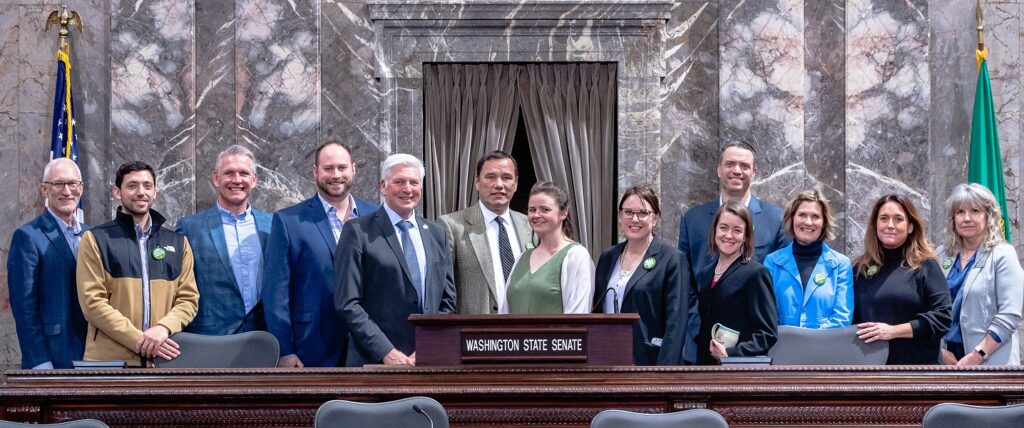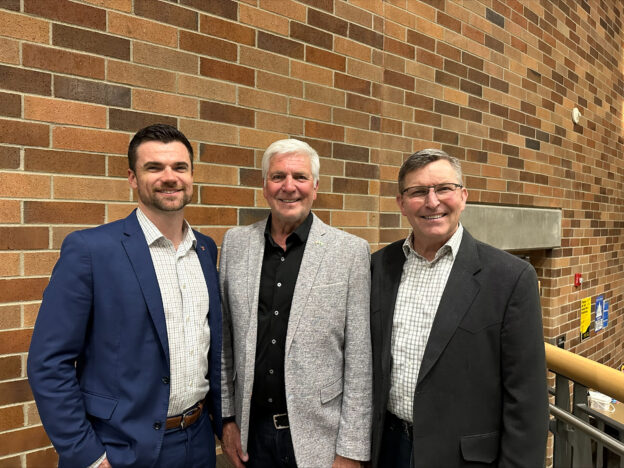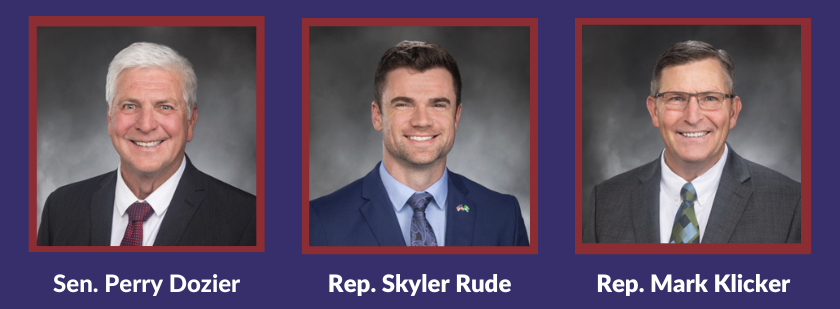
As lead Republican co-sponsor of a Senate bill about enhancing Washington’s tourism marketing efforts, and a member of the state Tourism Marketing Authority, it was my pleasure to meet with tourism leaders from throughout our state who visited the Capitol this week. We’ll know later this month if Senate Bill 5465 is wrapped into the Senate’s budget package. The House has passed what began as an identical bill (HB 1258), but I’m hearing it was changed and now would be less beneficial than the Senate proposal.
March 17, 2023
Dear Neighbor,
Greetings from Olympia! After pausing for a week-plus while we voted in the Senate chamber on which bills to send to the House of Representatives, the various Senate committees are hard at work again, looking at bills sent over to us by the House. The committees in the House are doing the same with the legislation we sent over.
More than 1,600 pieces of legislation were filed this session. Hundreds of them were culled during the initial round of committee work, which lasted nearly seven weeks. While that still left 600+ bills still in play, many more of those will fall by the wayside over the 17 days left for this current round of committee work. That’s how the process is supposed to work, and as a conservative who prefers smaller government, I’m OK with it.
Also, we’re close to seeing new budget proposals. State government runs on a two-year budget cycle, and in odd-numbered years the Legislature needs to adopt new budgets to pay for day-to-day government operations, capital investments, and transportation. I’ve already submitted requests for funding on behalf of the 16th District that fall into each category.
Next week I expect the budget leaders in the Senate and House will put proposals for 2023-25 on the table for the budget committees to refine. Sometime in April both chambers will push their own plans forward, then there’s more negotiating, and before the session ends April 23, compromises must be reached on each budget.

Here’s a sampling of legislation I’m following as we near the 2/3rds mark of the session.
Bills targeting firearms don’t get at real public-safety issue
Now that bills have come over from the House, my office received more e-mails this week about House Bill 1240 and HB 1143 than any other legislation. Here’s an example I received from Steven in Kennewick:
As HB 1240, the “assault weapons” ban, makes its way through the Senate, I am asking you NOT to support this legislation that violates our state and federal constitutions.
Data shows us that violent criminals are unchanged by gun control legislation. It’s time to pass laws that will hold criminals accountable, not punish law abiding citizens with unconstitutional laws like HB 1240. This is a bill to make people feel good – to make people feel like you’re solving the gun violence problem when all this bill does is infringe upon the 2nd Amendment rights of law-abiding citizens. It’s time for Washington legislators to pass common sense legislation. This is not it. The passage of this bill would cost taxpayers enormously when it is challenged in the courts due to its unconstitutionality. I respectfully ask you to vote NO on HB 1240. Thank you.
Like many natives of Walla Walla County, I grew up around guns. I’ve never been what you would call an avid hunter, but managed to bag a few pheasants in my younger days. As a legislator, I’m amazed that the majority Democrats seem so focused on the firearm and not the person wielding the firearm.
Here’s how I responded:
Over the past few sessions, we have seen various gun control laws introduced. I share the frustration and oppose efforts to further restrict our constitutional rights.
Democratic lawmakers, Governor Inslee and Attorney General Ferguson have consistently pushed legislation to restrict access to firearms by law-abiding citizens while simultaneously supporting policies that disempower law enforcement.
Problems with gun violence around our state are not due to law abiding citizens, they are caused by criminals with guns, many of whom obtained them illegally. Imposing that kind of liability will do nothing but further infringe on the rights of citizens.
I will stand up for our Second Amendment rights and do all that I can to slow the progress of these bad pieces of legislation. Given the makeup of the Legislature, stopping it altogether may not be possible, but I will voice your concerns and the concerns of many who have contacted me and my colleagues in opposition.
Both HB 1240 and HB 1143 are scheduled for public hearings before the Senate Law and Justice Committee next Thursday morning. To share an opinion about either (or both), you may choose between testifying — either in person or remotely — or simply stating whether you are for or against a bill, without testifying. Submitting written testimony is also an option. All the information you’ll need is available through this link.
Bipartisan progress toward serving students with special-education needs
According to the state Office of the Superintendent of Public Instruction, approximately 143,000 students in our state receive special-ed and related services. On average, that works out to about 14% of the students in any given school district – and the state sends nearly that much in extra funding to districts, specifically to support special-education services.
As a member of the Senate education committee, I know many of Washington’s 295 school districts have a higher percentage of students who require individual education plans (IEPs). They’re faced with using local dollars to fill the gap between the extra the state provides and the true cost of delivering those special services. That’s why I am glad to report that one of the Senate bills we sent across to the House earlier this month is SB 5311.
Besides raising the district-level cap on state funding for special ed, this bill also would provide parents of special-ed students with something they have wanted for a long time: dedicated advocates to help them work with their local districts on the creation of the individual education plans (IEPs) that guide the delivery of special-education services. At least one of these advocates would be delegated to each of Washington’s nine educational service districts, but they would work out of the state education ombuds office, which has a larger role already in helping parents navigate our state’s K-12 system.
A similar special-ed advocate bill came out of the Senate unanimously a few years ago with but was inexplicably blocked by Democrats in the House. We need to do better this year, because Washington’s constitution is clear about the duty to provide for the education of all children in our state.
Ag-overtime reform stalls in both chambers
One of the major disappointments of this session has to be the majority Democrats’ shabby treatment of bipartisan legislation that would offer our ag industry a measure of flexibility regarding overtime pay for farm workers.
SB 5476 received nothing beyond a public hearing from the Senate Labor and Commerce Committee, a month into this session – but that’s still more than HB 1523.
This all stems from the controversial ag-overtime bill approved in 2021 (a classic case of a good bill being hijacked and turned in the wrong direction), which in turn had to do with a state Supreme Court ruling in 2020, involving dairy workers.
I’ve received many questions from members in our ag community about the status of this legislation. I’m also aware of the concern about how to classify the year-round workers on farms who are often paid salaries instead of at an hourly rate – something else that deserves legislative attention.
***
Please remember I am here to serve you. Although we may not always be able to meet face to face, I encourage you to reach out to my office and to share your thoughts, ideas and concerns on matters of importance to you. Please, if you don’t already, follow me on Facebook. I look forward to hearing from you.
Sincerely,

Perry Dozier
























